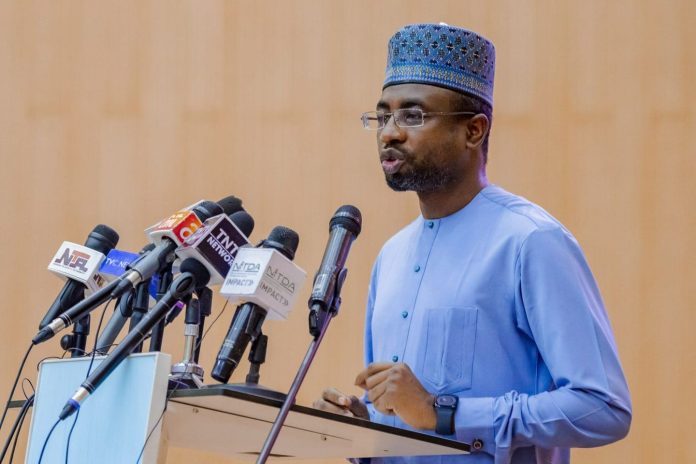In a landmark speech at the International Hybrid Symposium on Smart Agriculture 2023, Kashifu Inuwa, the Director General, National Information Technology Development Agency (NITDA), has reiterated the transformative potential of emerging technologies in revolutionising the agricultural sector in Nigeria.
The Symposium, organised by Federal University Dutsinma (FUDMA), in collaboration with Islamic World Educational, Science and Cultural Organisation, Morocco, themed “The Future of Smart Agriculture and the Role of Emerging Technologies in Achieving the SDGs,” brought together experts to discuss ways that will hitherto encourage smart agriculture, and showcased beneficiaries of the National Adopted Village for Smart Agriculture (NAVSA) from Federal University Dutse.
Inuwa, who was represented by Dr Aminu Lawal, SA on Digital Transformation, highlighted the significant strides made in the field of smart farming, which combines the power of data and computing technologies to enhance the efficiency and predictability of farming operations.
The DG said, every sector and industry has been impacted by digital revolution, and agriculture is not an exception. According to him, agriculture has witnessed shifts from primitive farming to mechanised farming and now in the digital or smart farming era.
He said in smart farming, the focus is on capturing data and interpreting them using computing technologies to make farm operations more predictable and efficient.
Inuwa stated that Digital technologies have been recognised as one of the critical enablers of agriculture transformation for increased food production to meet the global challenge of feeding this population and accelerate the achievement of goal number two, zero hunger, in the Sustainable Development Goals (SDGs).
He said, “there is a need to increase the production and profitability of farmers, increase the impact of agriculture intervention, attract youths and talents into agribusinesses, and use agriculture to diversify the economy. Digital technologies have the ability to change this narrative.
“Agriculture, if properly harnessed and technologies and innovations effectively introduced, the sector remains the number one sector for taking 100 million Nigerians out of poverty in 10 years and creating large well-paying jobs for Nigerian youths.
“Digital technologies can significantly reduce information access inequalities, improve the management and sustainability of natural resources used in farming, reduce the costs of linking sellers and buyers, and improve knowledge sharing and access to markets.
“With digital technologies farmers make more precise decisions on resource management, and farm processes, and better engagement between consumers and producers through increased and faster information analysis and the resulting insights; thereby leading to smart farms and making small-scale producers more competitive.” The DG said.
Inuwa further said that NITDA in its effort to facilitate digitisation of the agriculture sector developed the Nigeria Digital Agriculture Strategy (NDAS) in collaboration with the Federal Ministry of Agriculture and Rural Development and key stakeholders. The vision of the strategy is to make Nigeria the top three (3) most food-secure countries in Africa and the top 20 largest exporters of standard agricultural produce by 2030 through the use and application of digital technologies and innovations.
In an attempt to further digitise the agriculture sector, address those obvious challenges, exploit the opportunities and accelerate economic growth, the Agency came up with National Adopted Village for Smart Agriculture (NAVSA).
NAVSA is a technology and innovation-driven agricultural initiative aimed at addressing low agriculture productivity, inappropriate financing strategy, and repayment difficulties through the introduction of closed and open wallet systems on mobile payment platforms.
The initiative has been designed to accelerate the achievement of the Federal Government’s objectives on massive job creation, economic diversification, and growth. It builds and connects agriculture ecosystem players across the agriculture value chain to position agriculture as a business, attracts a youthful population into agriculture enterprises, ensures funds can be recouped through digital wallets, and values every farm produce for improved contribution to GDP and economic development.
He added that since its launch, its implementation and sustainability models, NAVSA continued to attract the attention of key players in the Agricultural ecosystem in line with global best practices.
Inuwa also noted that the Agency partnered with universities for the implementation of NAVSA to shape and model new generation of agriculturists to become smart farmers, thereby preparing them for the future of agriculture.
Earlier, in his welcome address, the Vice Chancellor of the University, Prof. Armaya’u Hamisu-Bichi, said that the theme resonated deeply in their quest for innovation, efficiency and sustainability within the agricultural sector.
He said “In an era where our world is confronted with numerous challenges ranging from population growth to climate change, it is imperative to harness the potential of emerging technologies.
According to him, smart agriculture, which integrates cutting-edge technologies such as Internet of Things, Artificial Intelligence and data analytics has the power to revolutionise farming practices, increase productivity, optimize resource management and enhance overall efficiency.
“It is through collective efforts and comprehensive strategies that we can attain this delicate equilibrium, fostering harmonious coexistence between agricultural production and environmental preservation,” he added.




